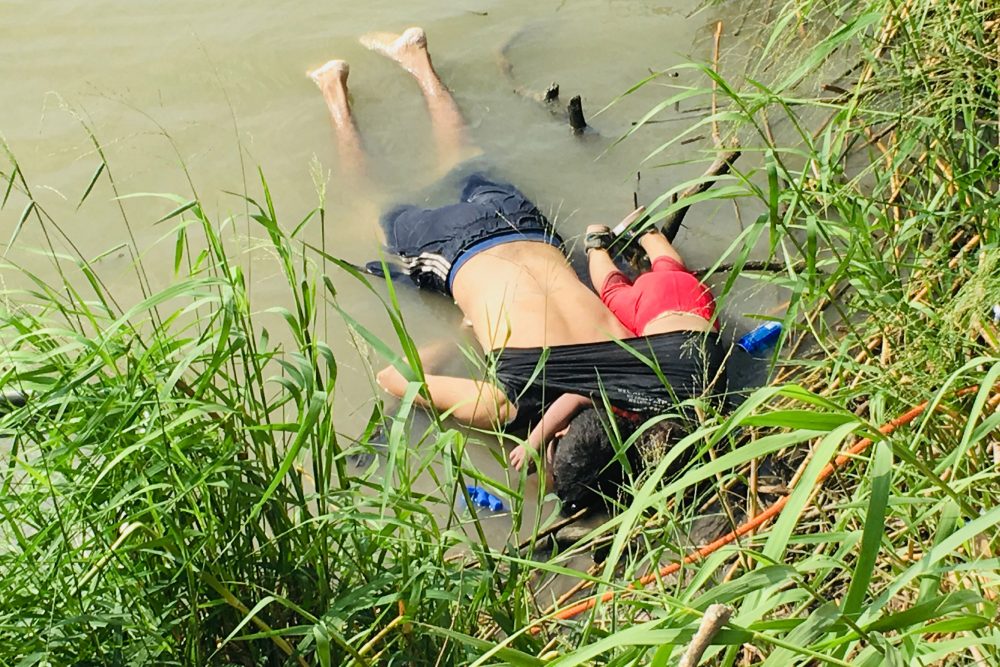The little arm gets me every time.
It’s the slack right arm of Valeria, a dead, 23-month-old Salvadoran girl, draped around the neck of her dead father as they lie face down in the muddy reeds on the banks of the Rio Grande in the indelible news photographs making headlines last week.
It’s the arm with which Valeria presumably clung tight to her father Sunday as the current swept them along and pulled them down during her family’s tragic attempt to make an illegal border crossing from Mexico into the United States.
Many of us know or remember the fearful, trusting embrace of a child. Many of us know the protective love with which it is returned.
And all of us can imagine the anguish of the girl’s father, Oscar Alberto Martinez Ramirez, in the final moment when he knew her innocent faith in him would not be redeemed, when he knew they would die together.
The photos, taken by La Jornada newspaper reporter Julia Le Duc in Matamoros, the Mexican city directly across the river from Brownsville, Texas, are heartbreaking enough.
But Valeria’s little arm makes the images gut-wrenching. It’s a reminder of the universal bond between parent and child and a symbol of the sometimes forgotten humanity of those we often lump together as problematic immigrants.
Much of their story is familiar. According to news reports, Martinez, 25, sold his motorcycle and borrowed money so that he, Valeria and his wife, Tania Vanessa Avalos, could seek asylum in the United States from the poverty and violence in El Salvador.
But when they reached our border, they found their way blocked by the Trump administration’s policy of “metering,” admitting only a small number of asylum seekers per day, leaving the rest to wait in hot, overcrowded Mexican camps for the chance to plead their case to American officials.
They decided to swim the Rio Grande instead. Martinez and Valeria made it safely across, but when Martinez headed back for his wife, little Valeria plunged into the water after him. He tucked her inside his T-shirt in the desperate, futile effort to save them both.
Their bodies were found the next day more than a quarter mile downriver amid discarded beer cans. She was still in diapers.
The photos were reminiscent of the haunting images of Alan Kurdi, the 3-year-old Syrian refugee whose drowned body washed up on a beach in Turkey in 2015, and have served as a similar reminder to those immersed in statistics and policy debates that these kids, these families, are not really so different from our own.
The images of the dead father and daughter “should piss us all off,” said Democratic presidential hopeful Julián Castro in Wednesday night’s debate. “If I were president I would sign an executive order that would get rid of … the metering policy (and) … honor asylum claims.”
“We would not turn back Valeria and her father Oscar,” added Beto O’Rourke, who was also on the debate stage, explaining what he’d do if elected president. “We would accept them into this country and follow our own asylum laws. We would not build walls. We would not put kids in cages.”
Republican President Donald Trump blamed the Democrats for the tragedy because the party has not helped him make it so difficult to obtain asylum that most would-be refugees won’t even try. Democrats “want to have open borders,” Trump said. “And open borders means people drowning in the rivers.”
In fact, of course, open borders — which very few Democrats actually support — would mean that families fleeing Central America could walk unimpeded across bridges spanning the Rio Grande and not risk drowning in its vicious currents.
The fly-specking of this particular story is in full swing on social media, with skeptics noting that the girl’s grandmother has told reporters that Martinez and his wife simply “wanted a better future for their girl.” This may be an excellent reason to want to come to America, they note, but it’s not a valid basis for which to ask for asylum.
Who gets to live here, why and when? How do we manage the flow of hopefuls humanely and in accordance with the values we purport to hold?
The vivid images of the corpses of the father and his daughter in a final embrace don’t make it any easier to answer these questions. But they underscore the urgency and moral imperative of addressing them.
Valeria’s little arm flung helplessly around her father’s neck reminds us that the “huddled masses yearning to breathe free” celebrated on the pedestal of the Statue of Liberty are not a vague, faceless blob.
They are collection of families, like yours, like mine, bound by a fierce, desperate love that outlasts death.
Eric Zorn is a columnist for the Chicago Tribune.
Visit the Chicago Tribune at www.chicagotribune.com
Distributed by Tribune Content Agency, LLC.
Send questions/comments to the editors.



Comments are no longer available on this story